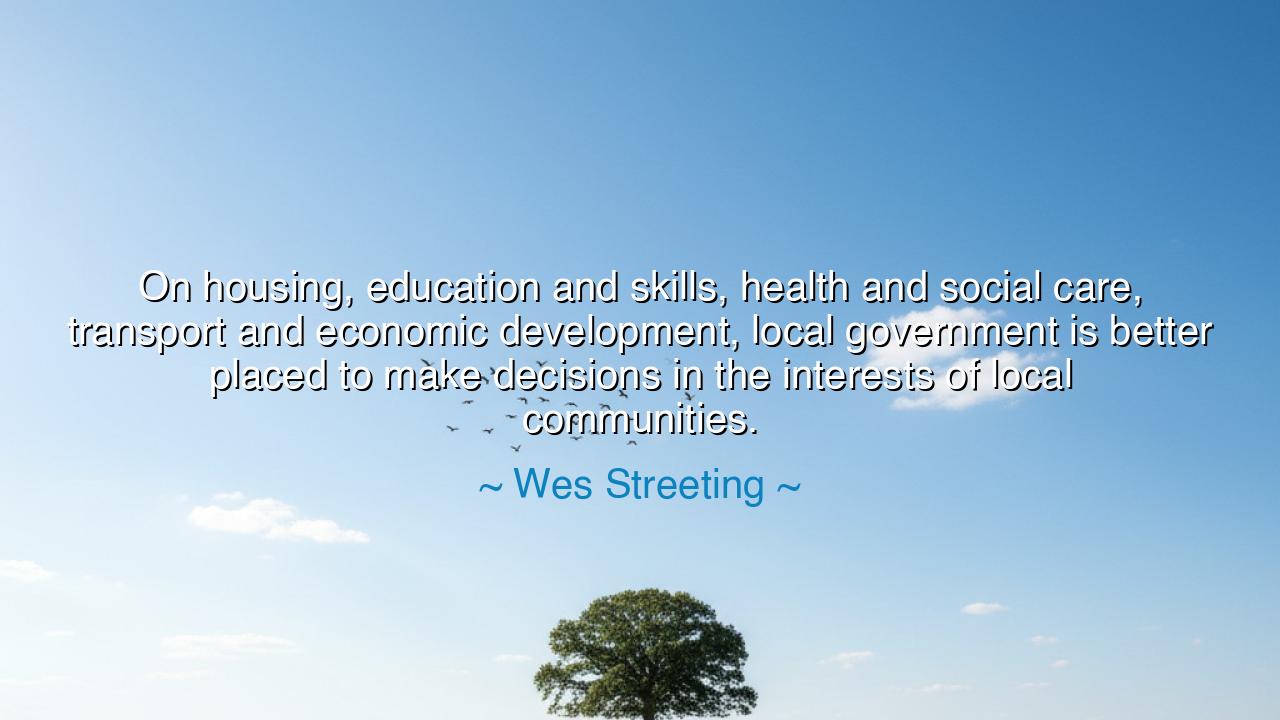
On housing, education and skills, health and social care
On housing, education and skills, health and social care, transport and economic development, local government is better placed to make decisions in the interests of local communities.






The words of Wes Streeting, spoken with conviction and vision, carry the tone of a man who believes in the power of the people: “On housing, education and skills, health and social care, transport and economic development, local government is better placed to make decisions in the interests of local communities.” Within this declaration lies not merely political policy, but a timeless truth about the nature of governance itself—that wisdom is greatest when it is closest to the people it serves. Streeting’s words are a call to restore trust to the local heart, to the towns, councils, and neighborhoods where real lives are lived and where decisions, made with understanding, have the power to heal and to build.
At its core, this quote speaks to decentralization, to the belief that those who dwell among the people best understand their needs. The issues of housing, education, health, and care are not abstract numbers on a government ledger—they are the daily breath of families, workers, and communities. A central government, however noble in intent, is too far removed from the rhythm of local life to hear its subtle heartbeat. Streeting’s words remind us that the true strength of governance lies not in distance but in closeness, not in command but in collaboration. The farmer knows his land better than the minister; the teacher understands her classroom more deeply than the bureaucrat; the healer knows the suffering of her patients better than any distant planner. Thus, local wisdom is not lesser wisdom—it is living wisdom.
The origin of this insight lies in both the political and moral traditions of democratic society. Wes Streeting, a modern British statesman and Member of Parliament, speaks from the lineage of reformers who believed in empowering the many, not the few. His vision echoes that of William Gladstone, who declared that self-government is the foundation of liberty, and of Alexis de Tocqueville, who saw in local councils the living seed of democracy itself. From the earliest parish meetings of medieval England to the modern town halls of the world, the idea has endured: that when decisions are made by those who share in their consequences, justice becomes not a theory, but a living force. In Streeting’s voice, we hear this ancient wisdom reborn for a modern age.
History gives us powerful testimony to the strength of local governance. In the aftermath of the Second World War, when much of Europe lay in ruin, it was not the distant ministries that first rebuilt society—it was the local councils, the mayors, the village committees, who, with scarce resources but abundant courage, restored homes, schools, and lives. They acted not from policy papers, but from the immediacy of human need. In Italy, in France, in Britain’s own bombed cities, local communities became the architects of renewal. They proved that when power descends to those who understand the ground beneath their feet, recovery is not imposed—it is grown.
Streeting’s words also hold within them a deeper, spiritual wisdom: that governance must be human before it is efficient. The more distant authority becomes, the more it risks forgetting the faces it governs. Bureaucracy, for all its structure, can lose the tenderness that true leadership requires. A centralized state, if left unchecked, can drift into arrogance, treating citizens as data rather than as souls. But the local leader—the councilor, the community organizer, the neighbor who serves—governs not through power but through relationship. He walks the same streets, breathes the same air, and is answerable not to statistics, but to people he meets each day. This is governance with a human heart—and it is what Streeting calls us to remember.
Yet his statement is not simply praise; it is a challenge. For local government, to deserve this trust, must rise to meet it with integrity, creativity, and courage. It must reject complacency and corruption, and embrace its role as the living bridge between citizens and the state. The people, too, must participate—not merely to be governed, but to govern themselves. A democracy’s strength lies not in elections alone, but in daily acts of involvement: in attending meetings, voicing concerns, volunteering, and holding leaders accountable. Thus, Streeting’s vision invites every person to reclaim ownership of their community—to see governance not as something done to them, but as something done with them.
The lesson, then, is both political and eternal: power must flow where compassion and understanding dwell. The greatness of a nation is not built from its palaces of law, but from its neighborhoods of care. When decisions rise from the ground rather than being imposed from above, they carry the weight of wisdom and the warmth of humanity. And when people see that their voices shape the paths they walk, their loyalty to justice deepens, and the bonds of society grow strong. This is the true foundation of democracy—not command, but communion.
So let the words of Wes Streeting echo like a bell through the corridors of power and the streets of every village and city: trust the local, empower the neighbor, honor the human scale of governance. For the state that listens to its people will never lose its way. Let those who lead remember that wisdom grows where lives are lived—and let every citizen remember that government is not a tower, but a circle, drawn wide enough to include them all. Only then will governance serve its truest purpose: not to rule, but to uplift.






AAdministratorAdministrator
Welcome, honored guests. Please leave a comment, we will respond soon